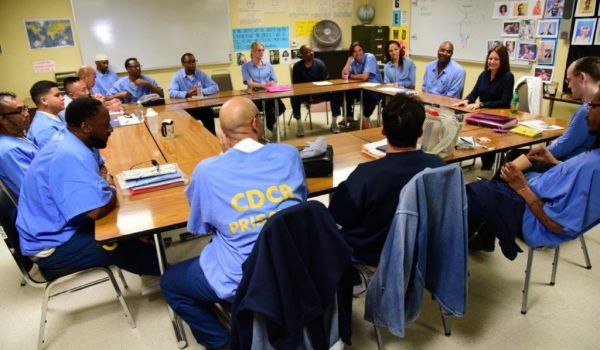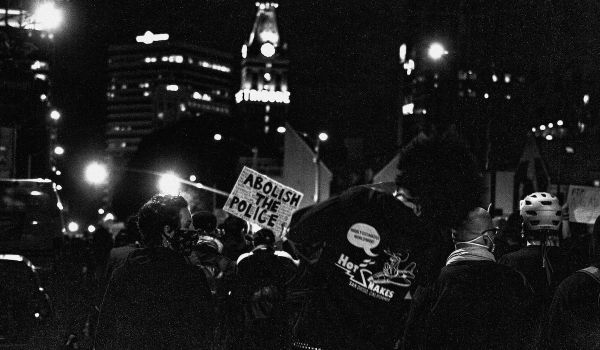Philadelphia Mayor Jim Kenney joined criminologists, journalists, prison reform advocates and the formerly incarcerated Monday evening at the world’s oldest “penitentiary” to lend his voice to growing efforts to fix America’s broken prison system.
“Obstacles get in people’s way, for some of them it’s obstacles they create, in others they are created for them,” Kenney said, speaking at the Eastern State Penitentiary, which is now a historic landmark open for museum tours. “But it doesn’t mean you don’t get an opportunity to come back to us as full human beings with full potential. None of us are perfect. We need to give people the ability to redeem themselves, and our communities will be better for it.”
What happens behind a prison’s walls will have an enduring impact on the communities to which 90 percent of inmates will one day return. Unfortunately, for all the advances in the science of criminology over the past century, the majority of America’s correctional facilities stubbornly adhere to a doctrine that is as structurally unsound as the crumbling walls of Eastern State Penitentiary.
It was fitting, then, that the Vera Institute of Justice would choose the spot to inaugurate an ambitious new program aimed at facilitating radical change in the U.S. correctional system.
The Vera Institute calls its new 18-month initiative Reimagining Prison. It commemorates the 10th anniversary of its “Confronting Confinement,” which reported the findings of a commission that interviewed hundreds of witnesses and visited dozens of prisons to examine safety and abuse in the system. Published in 2006, it begins, simply: “The conditions of confinement in our jails and prisons should concern everyone.”
According to Fred Patrick, director of Vera Institute’s Center on Sentencing and Corrections, Reimagining Prison envisions a smaller correctional system that “places human dignity at its philosophical and operational core and also promotes public safety, successful reentry and transparency.”
The project is designed to shift the goal and culture of U.S. incarceration from retribution to rehabilitation, producing stronger communities and improved public safety.
“We need to have a system that upholds its obligation to not do harm,” said Patrick.
Immediate goals include reducing the use of segregation and solitary confinement, preventing sexual assault in correctional facilities, and expanding access to post-secondary education for incarcerated people.
But to reimagine prison also means considering new ways of thinking about the correctional population and the purpose of incarceration itself. The program was formally convened in April after “60 Minutes” ran a segment on a fact-finding trip to prisons in Germany and Netherlands sponsored by the Vera Institute. I wrote about that trip for Next City in 2014, and described the stark differences between America’s culture of crime and punishment and that of some of its allies.
This includes not only how inmates are treated while they are incarcerated, but who gets incarcerated in the first place and why.
Prison is typically viewed as a last resort in many European nations. In Germany and the Netherlands, fewer than 1 in 10 convicted criminal offenders are actually sent to prison. In the U.S., that number is closer to 70 percent.
In Germany, up to a third of all criminal cases are diverted away from prosecution altogether requiring offenders to pay reparations, attend classes or do community service.
Kenney described working with city council to reduce the number of nuisance offenses — like disorderly conduct and public drinking — that lead to arrest.
“To saddle a young man or woman with an arrest record that they have to carry like a piano on their back for such a minimal offense is insane,” he said.
On Monday, the head of Pennsylvania’s Department of Correction, John Wetzel, said the task of reform is always difficult when dealing with an entrenched bureaucracy with a cultural aversion to change. He added that truly reforming the correctional system is as much about changing hearts and minds as it is about changing policy.
“Reimagining prisons starts with reimagining communities,” he said. “How do we grow a culture of empathy for our prisoners? We need to start by acknowledging the humanity of people in prison. People shouldn’t have to be defined by the worst thing they’ve ever done.”
Christopher Moraff writes on politics, civil liberties and criminal justice policy for a number of media outlets. He is a reporting fellow at John Jay College of Criminal Justice and a frequent contributor to Next City and The Daily Beast.
Follow Christopher .(JavaScript must be enabled to view this email address)
















